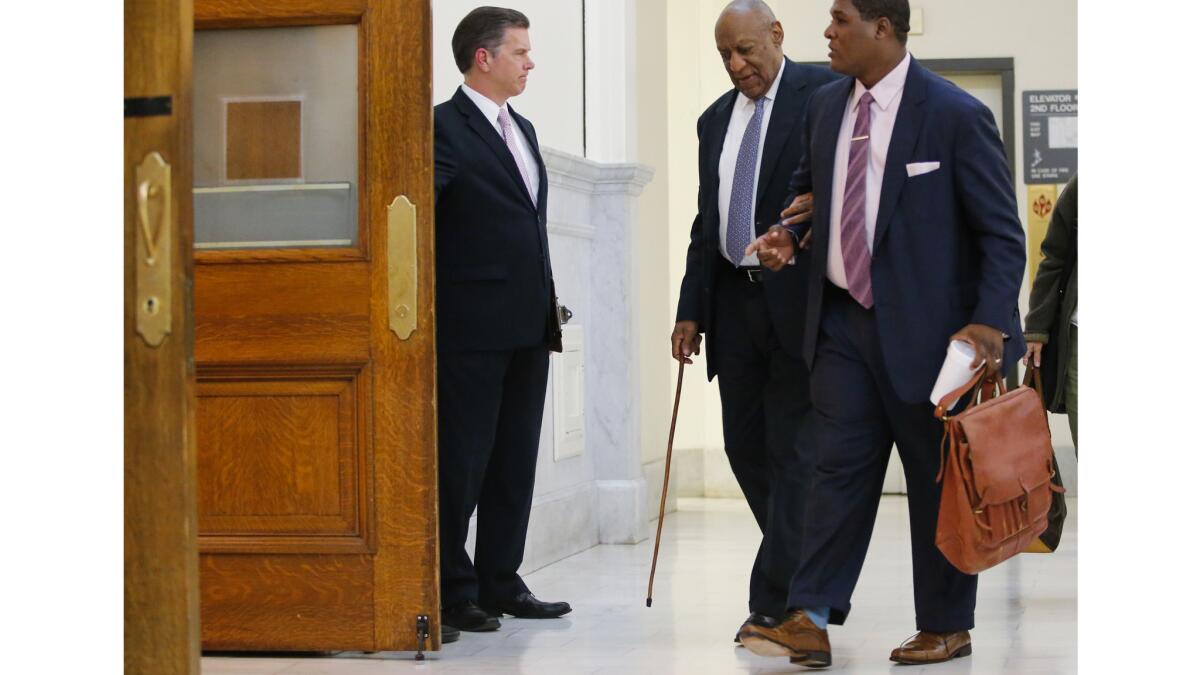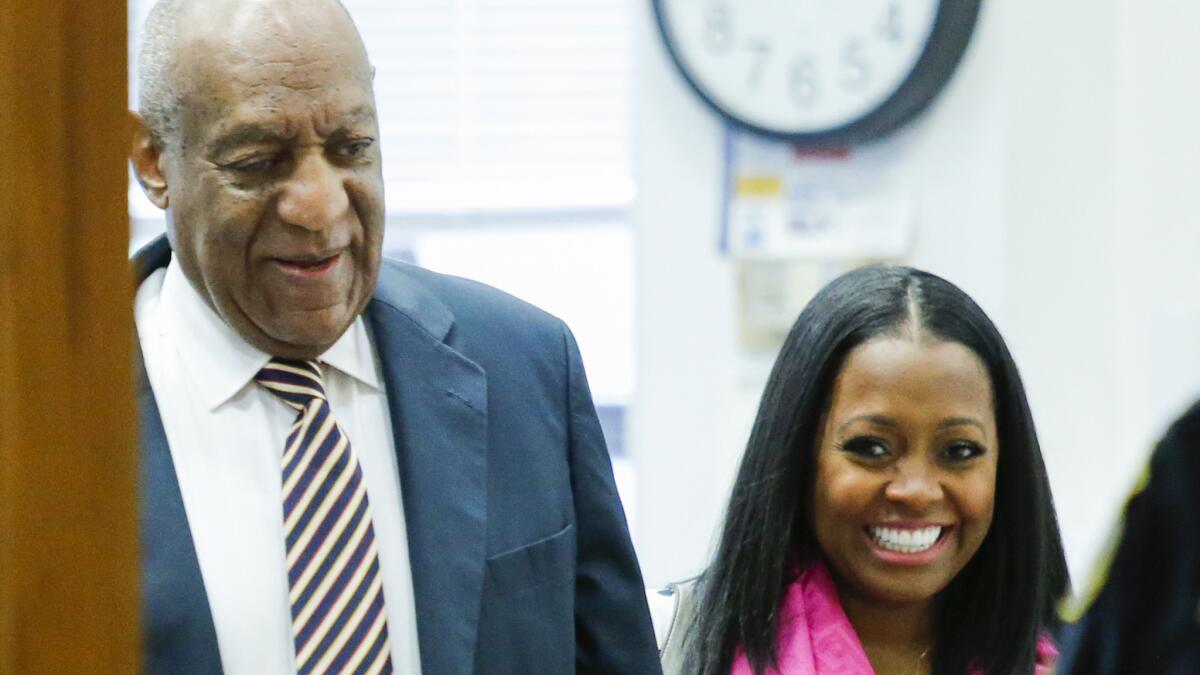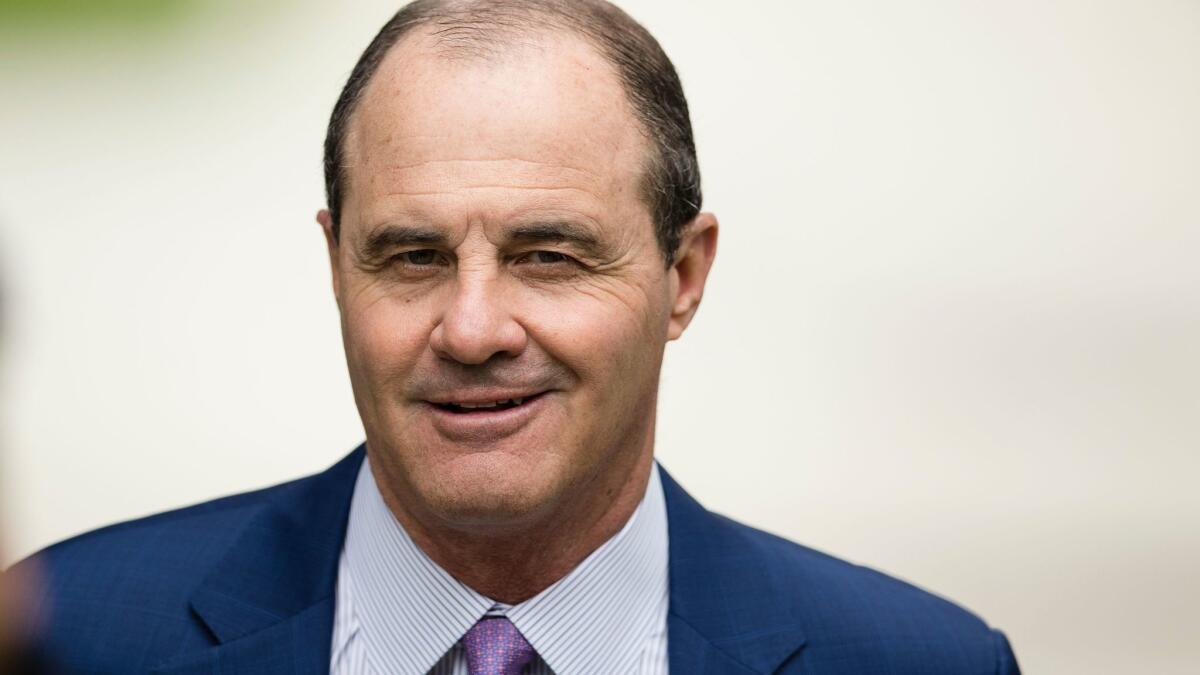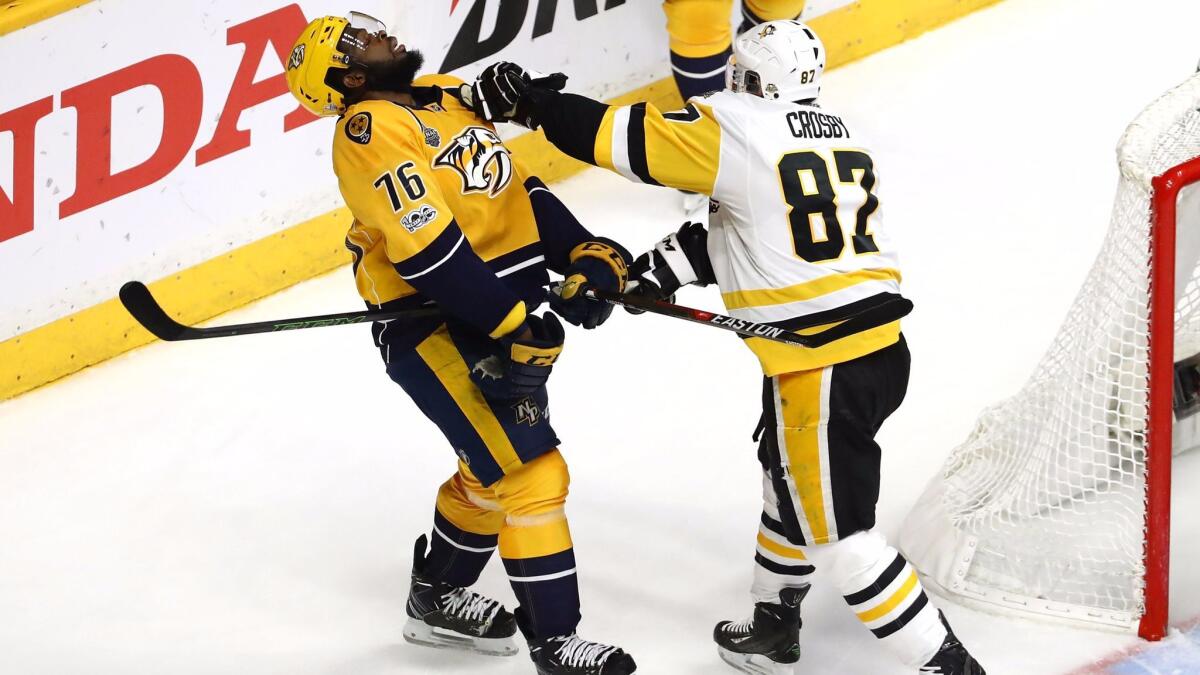Bill Cosby trial notebook: The tint of celebrity, and a window into another Hollywood

Closing arguments were expected June 12.
- Share via
Reporting from NORRISTOWN, PA. — Celebrity is a funny animal. Harnessing its power, total strangers can make us buy a movie ticket, stream a TV show, suffer a vicarious heartbreak or embark on a late-night shopping binge for GMO-free bath soaps.
But it can also, in certain cases, be turned against itself — can be what might be described as a self-cannibalizing force. Covering the sexual-assault trial of Bill Cosby at this suburban Philadelphia courthouse over the last week, I’ve been regularly treated to how celebrity can be unleashed in this manner.
I don’t just mean how Cosby allegedly leveraged his public persona to win women’s trust, though that’s the version you get from trial accounts of accusers Kelly Johnson and Andrea Constand. As Patrice Sewell, Johnson’s mother, testified on why her daughter lowered her guard to Cosby, “Our family all watched ‘The Cosby Show.’ It kind of reminded us of our own family.” It was an easy leap, she said, for Johnson to think Cosby had her interests at heart.
No, I’m referring to the subtle ways a person’s past celebrity can shade how we take in new information about them. The allegations made about Cosby would be morally serious no matter who they were made against. But the fact that they were leveled against an icon means they’re also being leveled against his former self — leveled against someone who we, collectively and implicitly, had previously embraced. And that throws them into more troubling relief. By making us doubt him, they make us doubt ourselves.
That former self has been in evidence over the last week. Many of the wire-service photos of Cosby you’ve seen from the courthouse here have been of a hobbled 79-year-old man with a walking stick and hunched shoulders.

But inside the court room images of a past Cosby have glimmered through.
A selfie of him with Constand’s mother, Gianna, projected on the courtroom screen, reminded everyone of a younger, warmer and more affable figure, a Cliff Huxtable: Sage Dad, not Bill Cosby: Accused Abuser. In one of those images he was even wearing a loud sweater.

Or, more pointedly, the specter of “The Cosby Show’s” Keshia Knight Pulliam, one of several boldfaced names who’ve turned out to support the entertainer, walking him into the courthouse and sitting in the front of the defendant section. The visage of TV’s Rudy, 30 years later but still unmistakably the heart-melting pipsqueak, did perhaps more than anything else both to remind of and subvert Cosby’s celebrity. This is the man who engaged in dozens of aw-so-cute TV reactions, it seemed to say; what do you think of him now?
And indeed that may either soften our view of him — or, as it did for me and so many others, underscore its contrast to now.
This isn’t just a cultural phenomenon. It could have legal consequences too. The jury has been charged to take into account only the facts of this case, to disregard all they’ve heard or thought about Cosby, including his life in entertainment. But jurors are human, and for many their perception of the defendant will play into how they see the events in dispute here. Will the reminders of how beloved Cosby once was make a jury more likely to believe his account that he did not assault Andrea Constand?
Or will it reinforce how far he’s fallen and make it more steadfast in its desire to convict him?
An ugly side of Hollywood
Speaking of the past, it’s not just an entertainer from another era that’s coming to the fore at the Cosby trial — it’s entertainment itself.
Threaded through much of the testimony this last week has been reminders of Hollywood machinery. Hollywood machinery, that is, as it grinded and lurched 25 years ago.
The testimony of numerous witnesses has provided a window into how the agency and personal-management side of the business functioned in that earlier age. Key to the prosecution’s case is the aforementioned Johnson, who once worked for Cosby’s then-agent, Tom Illius, at what was then the William Morris Agency.
You’re not imagining all the “then’s.” Some of the descriptions of the entry-level world in which the Hollywood assistant toiled remains relevant; anyone in a current agency mailroom would smile at some of the details, like the class system in which “floaters” are at the bottom of even the untouchable rung. And agent bosses could be as tough-minded then as now. Even the defense and Johnson, who can’t agree on much, can agree on one thing: Illius could be a difficult personality. “Tom’s reputation preceded him,” Johnson said, as she described how quickly the late agent cycled through assistants.
But much of what’s recounted here feels decidedly of another era. Cosby set Constand up on a meeting with Lou Weiss, a pater familias of the old WMA who retired in 2007. He also arranged a meeting with Charles Kipps, who helped create “Fatherhood,” the short-lived Nick at Nite animated series, with Cosby circa 2004 and hasn’t been terribly high-profile since. These are not current movers and shakers.
One can only hope that attitudes toward women have changed since the time described. In 1992, when Johnson returned from maternity leave, she told of how she was greeted in the hallway by one of WMA’s star clients.
“Hey look, there you are, take a twirl,” Cosby allegedly said to her.
“He had me do a little twirl right there and then said ‘you look good’ and I went back to my desk,” she recounted.
A prosecutor then followed up with: “And there were no female agents standing around watching you twirl?” She said no.
Even then, parts of that way of life were fading, the last tendrils of a more clubby time. The name William Morris itself, tossed around by lawyers and the judge as if it’s a functioning concern, reminds of the frozen-in-amber nature of these events, since of course WMA merged with Endeavor nearly a decade ago and became an entirely different beast, the Ari Emanuel-led WME Entertainment. It’s hard to imagine the figures from the old WMA even conceiving of the MMA-minded agency of today.
This wasn’t a time when international grosses and an army of brand representatives governed decisions but, at least in many quarters, when a handshake and hunches did, when the power wasn’t held as much by Marvel executives and flashy young talents like Jennifer Lawrence as much as by old-time performers like, well, Bill Cosby.
Even some of the poppier celebrities brought up at the trial thrummed with a different feeling.

One stark example: Maxi Priest. What does a forgotten British reggae star have to do with the proceedings? Here’s what: The defense sought to get closer to an innocent verdict by citing, rather abruptly, the 1990s’ celebrity, who apparently had a romantic connection to Kelly Johnson. The defense’s attorney, the showman Brian McMonagle, sought to create the impression of the Cosby accuser as an out-of-control partier. At one point McMonagle asked Johnson if she had done drugs with Priest; another time he blurted out that Priest was the father of her son and that they had engaged in a custody battle.
Clearly it was meant to show that Johnson ran with a fast crowd. But It was unclear what effect this will have on jury members, the preponderance of whom appear under 40 and probably have little idea who Priest is in the first place. Certainly that was true for others in the courtroom, like the young millennial reporter seated near me who turned and asked, “Who’s Maxine Priest?”
But of all the bygone names to come up, Illius’ may be the most evocative. The agent had a roster of clients that reads like a VH-1 retrospective. In fact, Cosby is among the last in the stable still alive or at least, in some way, in the public eye, from a list that at one time included Tony Orlando, Jerry Lewis, Debbie Reynolds and Charo.
Whatever one thinks of Cosby, his trial is a reminder that Hollywood eras don’t last forever. And that includes the current one.
The sports angle
Entertainment here hasn’t just come in the form of Hollywood. Sports has played a surprisingly large role at the trial too.
Constand was once a basketball player at the University of Arizona and ran operations for the women’s team at Temple University in Philadelphia. Her job at the program, under the oversight of then-coach Dawn Staley, has hovered and so has Staley, an emerging basketball legend who played on numerous Olympic teams, led Temple to all sorts of titles and just a few months ago led the University of South Carolina to its first-ever national championship.
But sports has also been factoring in in a less probable way. The jury in this case is drawn from the Pittsburgh area (the defense wanted a pool not exposed to a local political campaign for district attorney that had Cosby its centerpiece). And Pittsburgh is in the throes of a second consecutive Stanley Cup chase, with its Sidney Crosby-led Penguins ahead of P.K. Subban’s Nashville Predators by a game count of 3-2, with a chance to wrap up the series and hoist the big chalice in Nashville Sunday night. If not, they’ll return to the Steel City for a deciding game seven Wednesday night.

In instructing the jury, the judge, Steven O’Neill, has made reference to the finals numerous times, telling the jury he’ll have them out for puck-drop on Thursday night. “If the headlines are ‘Philly Judge Accommodates Pens fans, I’m OK with it,” said the judge from this Flyers-mad city. And he cautioned they were expected back in their hotels by evening Sunday night, which was OK because the game was taking place then. When he asked them what time the puck dropped, a few of them replied with the exact start.
Jury deliberations could commence as early as Tuesday and will most certainly be going Wednesday. Whether the series ends in the Pens’ favor Sunday night — or, here’s hoping, is extended by the lovably underdog Preds to Wednesday — the jury will be deliberating with the fate of their team having just been decided or just about to be decided. That means their state of mind could be in a fragile place as they consider the fate of this most prominent defendant, will be either really exultant of really anxious.
Could the Stanley Cup finals, then, influence whether jurors are feeling more forgiving — could Crosby affect Cosby? No legal expert I spoke to would go that far. But they acknowledged that juries’ state of mind is indeed a factor in deliberations. Of all the many forces exerting themselves on this trial, you can add the power-play slap-shot of P.K. Subban to the list.
See the most-read stories in Entertainment this hour »
Twitter: @ZeitchikLAT
More to Read
Only good movies
Get the Indie Focus newsletter, Mark Olsen's weekly guide to the world of cinema.
You may occasionally receive promotional content from the Los Angeles Times.










